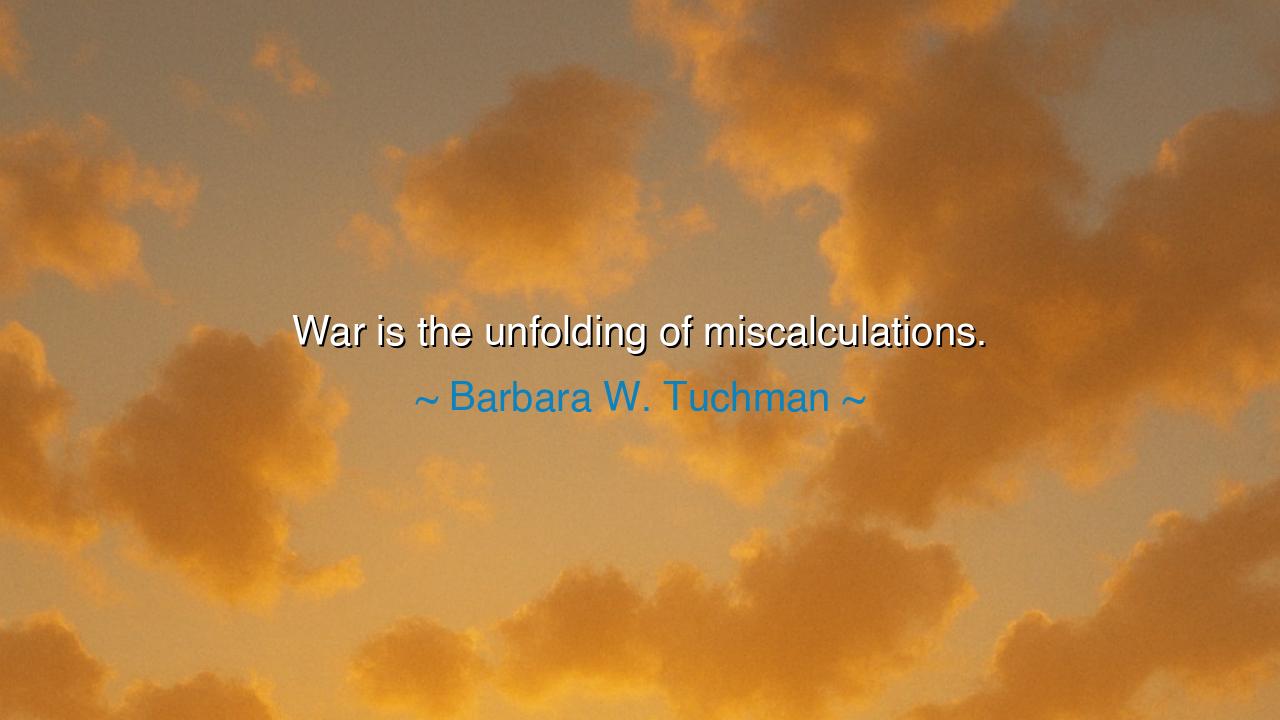
War is the unfolding of miscalculations.






Barbara W. Tuchman, historian of tragedy and folly, spoke with piercing clarity when she said: “War is the unfolding of miscalculations.” In these few words she revealed a truth that rulers often hide and peoples often forget: that most wars are not born of wisdom, but of errors — errors of pride, of judgment, of foresight. What seems in the beginning like a swift strike or an easy victory unravels into years of suffering. Thus, war is not merely the clash of armies, but the harvest of countless mistakes made by leaders and nations.
To call war an “unfolding” is to speak of it as a process, like a scroll slowly unrolled before the eyes of men. At first, the mistakes are small — a boastful speech, a rigid demand, a refusal to compromise. Then come the misread intentions, the overestimated strengths, the underestimated enemies. Each error adds to the next, until suddenly the world is engulfed in flames. Tuchman’s wisdom lies in showing that wars are rarely inevitable; rather, they are the fruit of compounded miscalculations, cascading forward until they can no longer be stopped.
The First World War offers the clearest example of her teaching. In 1914, Europe’s leaders stumbled into a catastrophe no one had truly intended. Austria thought to punish Serbia quickly. Germany believed the war would be short. Britain assumed its entry would tip the scales with ease. Russia misjudged its own strength. Each miscalculation by itself might have been contained, but together they unraveled into four years of slaughter, empires destroyed, and millions dead. Here, Tuchman’s words take on flesh: the war was nothing more than folly revealed step by step.
Nor is this confined to the distant past. In Vietnam, the United States miscalculated the resolve of its enemy, the support of its allies, and the power of its own might. Leaders believed they could crush resistance with technology and numbers, but instead the jungle swallowed their armies, and the people at home turned against the conflict. What began as confidence unraveled into humiliation. Once more, war was shown to be the unfolding of human error, not the execution of divine destiny.
Yet Tuchman’s wisdom is not spoken only to kings and presidents. It is spoken to every soul. For are not our own quarrels often born of miscalculation — of assuming the worst of a friend, of overvaluing our pride, of underestimating the pain we cause? How many feuds in families, rivalries in communities, and conflicts in daily life arise not from necessity, but from mistakes unacknowledged, from stubbornness that grows until peace is lost? The great wars of nations mirror the small wars of the heart.
The lesson is clear: the path to peace begins in humility. If war is the unfolding of miscalculations, then peace is the fruit of foresight, patience, and compassion. To avoid error, one must listen more than speak, reflect more than react, and consider not only pride but the cost of suffering. A wise leader — and a wise soul — learns to pause before striking, to weigh consequences beyond the moment. For every step taken in arrogance may become the first step toward ruin.
Therefore, beloved, take this teaching as a lamp for your path. In your dealings, guard against the errors of haste, pride, and blindness. Seek truth before judgment, dialogue before anger, understanding before vengeance. For if you can prevent the first miscalculation, you may prevent the entire unfolding that leads to conflict. And if nations would learn the same, then many wars could be averted, and mankind might walk a straighter road.






HTHuong Ho Thi
Tuchman’s view on war as a result of miscalculations makes me wonder about the role of overconfidence in decision-making. When leaders or nations believe they can control outcomes without fully understanding the situation, they risk plunging the world into conflict. How can we address the root causes of these miscalculations, and how do we build systems that prioritize foresight, humility, and collaboration to prevent war in the first place?
GFGyh Fhj
This quote makes me question the human tendency to assume certainty in situations of high stakes. How often do leaders, driven by their own beliefs or limited information, miscalculate their way into conflict? If war is the unfolding of miscalculations, how can we develop a more nuanced approach to decision-making in international politics, where we carefully consider the consequences before taking any drastic actions that might lead to war?
BBBao Bao
Tuchman’s words resonate deeply when we consider the course of many historical conflicts. How much of war is truly avoidable if nations better understood each other’s perspectives and intentions? Could improved communication and diplomacy have prevented some of the most devastating wars in history? Is it possible to reach a point where nations no longer miscalculate the outcomes of their actions and instead work toward lasting peace?
MTVo Thi My Tam
This quote is a sobering reminder of the fragility of peace and the catastrophic consequences that miscalculations can have. In modern times, could the same be said for political tensions and international relations? How often do countries misjudge one another’s intentions, leading to unnecessary escalation? Can we learn from history’s mistakes and improve diplomatic processes to prevent future wars caused by miscalculations?
MCNguyen Minh Chau
Tuchman’s quote makes me reflect on how the complexities of war often arise from errors in judgment, misinterpretation, or overconfidence. How many conflicts have been initiated based on flawed assumptions or incorrect calculations? Is war simply the result of decisions made by individuals or nations who fail to see the full picture? What can we do to improve our understanding of global dynamics so that such miscalculations are avoided in the future?